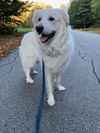|
Barking Dog Farm Rescue
|
HomeAnimalsAbout UsContact Us | |
|
•Food and Water Bowls •High quality puppy or dog food •Crate. We are huge advocates of crate training. It has so many benefits and should be looked at as your dogs bedroom and a training tool. Not a cage. •Collar or Harness and a Leash •Brush or Comb •Nail Clippers •Toys- We recommend Kongs, Snuffle mats, food puzzles and any toy that will keep your pup busy and thinking. Toys are used for entertainment and enrichment. Dogs have different preferences in toys. Some like squeaky, some like hard rubber, chew toys or balls. Get to know your dogs preference before investing alot in toys.
•Training treats- careful not to give too many as your friend may get diarrhea. Kibble can also be used for training. •Stain Remover or Enzymatic Cleaner for Accidents. We like Nature's Miracle. •Dog Bed-you may want to hold off on a fancy, expensive bed until you know your new friend won't chew it. •Schedule a new pet wellness exam with you vet. •Sign up for a Puppy Obedience Class once you get go-ahead from your vet. ☆We generally will tell you what the puppy has been eating. We try to keep them on the same or similar food they have been eating. When switching formulations, the two foods should be mixed gradually over the course of several days to avoid stomach upset. Your puppy needs to eat 3 times a day, starting at 1 cup per feeding and given about 15 minutes to consume what they want. If your puppy has food left over or is still acting like they are starving you can adjust accordingly. Increase the amount as they grow. You should be able to easily feel their ribs when you press on their sides but should not be able to see their ribs. A fat large breed pup is is hard on their growing bones. At a year old, your puppy should be transitioned to an adult food. One of the most important things that you can do for your adult dog's health is to keep them lean. Being overweight can significantly predispose them to joint issues. ☆Water should be available at all times unless you find this to be a problem with potty training. In that case, offer water with meals and 2 hours before bed until training is under control. ☆Puppies require more baths than adult dogs. We do not recommend bathing an adult dog right away as this can be very stressful. It is a good idea to practice handling your puppy's feet and toes, to make certain that your puppy is not alarmed by future nail trims. ▪︎Puppies naturally play rough with one another from a very young age and so may continue when you bring a pup home. Teach children that when the puppy is excited and too rough, to seek higher ground (like the couch.) Children should also use dog toys to play with the puppy rather than their hands or clothing. Never allow a puppy to chew on hands. A loud shriek will tell the pup it hurts and to stop. ▪︎VACCINATIONS... Your puppy has had at least two set of vaccines. We are strong proponents of vaccinations and the use of flea, tick and heartworm control. The majority of our dogs come from the south and have likely been exposed to heartworms. We use Interceptor Plus monthly or Heart Gard Plus, which protects against Heartworms, roundworms, hookworms, whipworms and tapeworms. ▪︎Even though all of our puppies and adult dogs are wormed and receive a negative fecal before adoption they can still test positive weeks later. Mothers may have dormant roundworm parasites that are released during pregnancy or nursing and pass them onto their puppies. Often several deworming still may miss dormant eggs. We highly recommend you do a couple fecal exams in first few months after bringing home your dog. Loose Stools.....May be brought on by many different things, but STRESS starts the process changing homes and leaving family behind, changing food without mixing old and new for a week or more. Two common parasites that can be missed on a fecal are: Coccidiosis, a parasite that resides in a dogs intestine. Stress may cause a flare of Coccidia infection, easily treatable. Giardia. This parasite is found in many animals and veterinary research suggests that many puppies and well cared for dogs carry Giardia, often without demonstrating symptoms. It is also often found in stagnant water so never allow a pup to drink from mud puddles or ponds. We also highly recommend that in the first 5 or 6 months of your puppy's life (until fully immunized) to avoid public parks and rest areas, anywhere your puppy may come into contact with other dogs feces. This is the primary way for your puppy to contract worms, parasites, illnesses or even life threatening Parvovirus. We want to help you make the transition of bringing your new fur baby home a smooth one. Please never hesitate to ask questions. We are here for you. |




